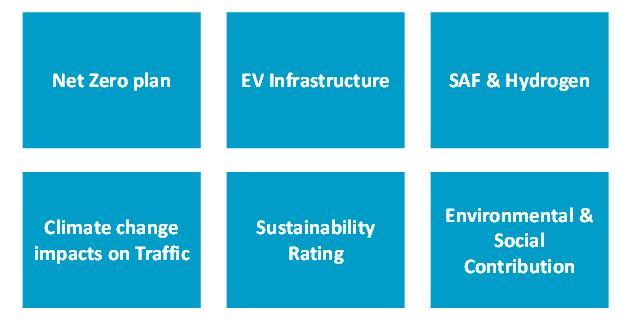Almost three years ago, the aviation industry agreed to the target of Net Zero by 2050.
Both the Airport Council International (ACI) and the International Air Transport Association (IATA) announced their commitment to slash CO2 emissions for this difficult-to-decarbonize sector by boosting operational efficiency, using renewable energy, developing new technologies and using sustainable aviation fuels.
Today, the question is not if but how each industry player will meet this target.
Why are airports important to decarbonising aviation?
Net Zero targets are just the tip of the iceberg. Sustainability commitments, covering environmental, social and governance (ESG), are on the agenda for all responsible businesses across the world and airports are no different.
While airports are directly responsible for a very small portion of aviation’s carbon emissions, their role in the value chain means they have a unique opportunity to design how the aviation industry operates. Airports can influence commuter transit, the type of equipment and vehicles that ground handling companies can use on the airfield, the type of engine and aircraft that can operate, fuel types, flight paths and a host of other factors.
To assist our airport clients in capitalising on this influence, Steer has developed the Sustainable Airport Toolkit, providing tangible technical and commercial solutions to help meet sustainability and other ESG targets. These range from developing Net Zero plans to assessing an airport's overall sustainability rating.
Steer’s Sustainable Airport Toolkit
Being a sustainable business is not just a headline; it is a commitment, a strategy and a mindset. If airports are to be sustainable, they need to start with the basics of drafting a strategy that is aligned with their company strategy. This strategy needs to be built up, in a prioritized order, from the individual strategies of ESG areas.
These strategies can then be atomized into plans and specific initiatives with key performance indicators (KPIs) linked to each initiative. Part of this will naturally be financial. The financial implications (positive and negative) will need to be integrated into the airport’s business plan and assessed to determine whether the proposed initiatives are achievable from a financial perspective.

Our Sustainable Airport Toolkit includes:
- Net Zero plan: Steer can help airports to develop a Net Zero plan and, based on a financial model, determine their Net Zero deadline. The plan will include specific actions to reduce emissions for scopes 1 & 2 by the maximum possible.
- EV infrastructure: Steer can calculate the required Electric Vehicle (EV) infrastructure at an airport based on the expected demand from passengers and companies working at the site. The financial model developed by Steer determines the required investment and the operating costs, providing options for a cash-generating business model.
- SAF & hydrogen: Steer can calculate the required sustainable aviation fuel (SAF) and hydrogen infrastructure at an airport based on the expected demand from airlines (linked to state policies) and the companies working at the site.
- Climate change impacts on traffic: Steer’s sophisticated traffic forecasting tool includes the future impacts of climate change, which are mainly related to CO2 emissions costs, SAF, and travel behaviours.
- Sustainability rating: Steer uses its Airport Sustainability Rating© proprietary tool to evaluate how advanced an airport is in environmental, social and governance (ESG) matters.
- Environmental & social contribution: Steer will audit the financials of an airport and provide a certificate stating the Environmental and/or social monetary contribution in a given year.

Financial and non-financial sustainability need not be mutually exclusive. Our Sustainable Airport Toolkit can help airports achieve ESG goals, turn a profit and transform into the low-carbon facilities of tomorrow that our industry needs.
